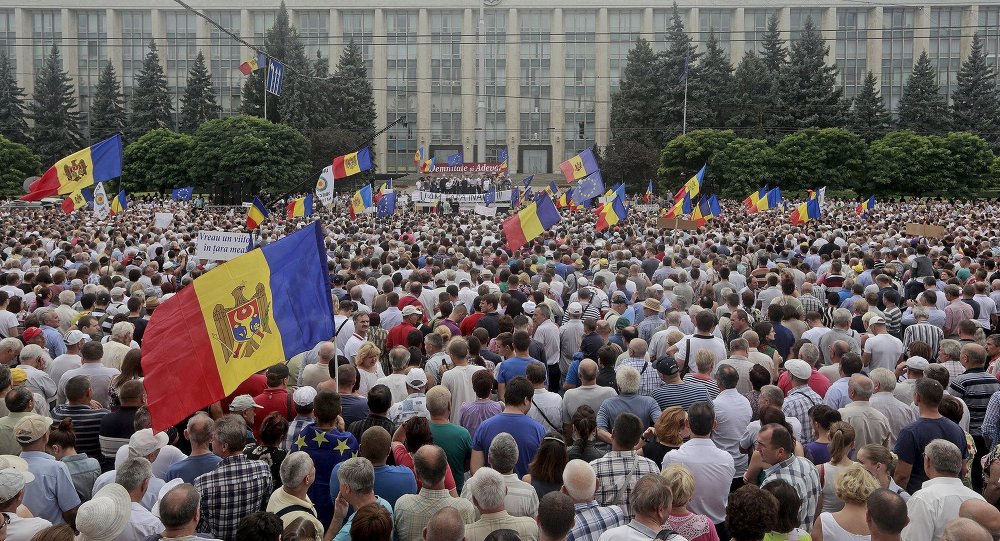
Russia Watches and Puts Own Spin on Moldova’s Crisis (Part One)
Publication: Eurasia Daily Monitor Volume: 13 Issue: 24
By:

Many international observers anticipated that Russia would move to exploit the anti-government protests in Moldova in order to (as the assumptions went) “destabilize Moldova’s pro-Europe government,” “halt and derail Moldova’s European course,” or even stage a “Maidan in reverse” in Chisinau. The Kremlin was, at a minimum, expected to exacerbate Moldova’s disorders through propaganda and covert interference, leading perhaps to full-scale political or even strategic Russian exploitation of Moldova’s crisis. The specter of Ukraine’s Donbas partly inspired such predictions with regard to Moldova.
Yet, after several weeks of anti-government protests (and an even longer period of non-governance) in Chisinau, those predictions about possible Russian actions have not been borne out. They were implausible all along for a number of reasons, some of them fairly perceptible (see Part Two). Nevertheless Washington, Brussels and Bucharest remain concerned about the possibility of direct Russian interference in Moldova, and apprehensive about regime change from Vladimir Plahotniuc’s rule to pro-Russia forces.
Those considerations have produced an expediency-based approach to Plahotniuc’s monopolization of state power. Western diplomacy regards his pocket government (installed on January 20) as bringing stability, so as to keep Moldova from total collapse and/or from going Russia’s way. The underlying logic holds that Plahotniuc’s state capture through corruption is acceptable as the least bad choice, preferable to collapse or a Russian takeover in Moldova. It is a forced choice, one that looks like an emergency response to an emergency situation.
Yet, there is still no sign that Russia is about to interfere directly in Moldova. The Kremlin’s policy remains, if anything, one of malign neglect of Moldova from the outset of this crisis to date. Kremlin media and government spokesmen have been slow to respond, and their reactions do not seem to reflect a sustained interest or a sharply focused policy.
To be sure, Russia does persist with measures aiming to hurt Moldova economically and influence its politics. These are Russia’s pre-existing policies, without showing new initiatives. Moscow is biding its time, possibly making contingency plans for pre-term elections to be held in Moldova.
Meanwhile, Moscow is skillfully exploiting the West’s uncritical acceptance of Plahotniuc’s consolidation of power. Russian propaganda had basically ignored Plahotniuc until now, and the Kremlin ignored his personal overtures. But the West’s undeclared pact with Plahotniuc’s government for “stability” has suddenly turned him into a target of opportunity, alongside the West, for Russian propaganda. This now conflates Plahotniuc and the West with each other, so as to discredit Western policy in the perceptions of Moldova’s populace (Rossiyskaya Gazeta, January 29; Russian TV Channel One, Rossiya TV, January 24, 28–29, February 1).
Plahotniuc and his circle are seen as embodying corruption and misuse of power in Moldova. He has a personal negative rating (the difference between approval and disapproval rates) of minus 80 to minus 90 percent in the opinion polls. Russian propaganda is now working to taint the West with Plahotniuc’s image in Moldova.
The recent mass protests, which targeted corruption generally and Plahotniuc’s government specifically, are depicted by Moscow as protests against the consequences of “European integration.” Plahotniuc’s Moldovan government is supposedly “pro-Europe” and apparently works with the West. Uncontested by the West itself, these perceptions allow Moscow to discredit Moldova’s “European option.”
Russian propaganda exploits the fact that Brussels, Washington and Bucharest have long bestowed the title “pro-Europe” on Chisinau’s governing coalition, and on Plahotniuc’s Democratic Party specifically, despite all evidence to the contrary. Bureaucratic and intellectual inertia, hopes for the better and fears of the worse combined to maintain that assessment in Western councils and public diplomacy. Only now is that assessment in the process of being revised. But the Moldovan population cannot perceive a revision as long as Western diplomacy goes along with Plahotniuc’s full seizure of power, partnering with his government for “stability” and (again) hoped-for reforms (see EDM, January 11, 12, 14, 15, 21, 28, 29).
The recent mass protests in Moldova transcended ethnic-linguistic, ideological, and “geopolitical” dividing lines. Moscow depicts these protests as a broad-based popular movement, one implicitly vindicating Moscow’s own antagonistic view of the European Union. Although the protests are targeting corruption, “oligarchy,” and Plahotniuc’s government, Russian television channels imply that Plahotniuc is the West’s protégé and attribute an anti-Western slant to the protest movement. They pass over in silence the fact that not a single anti-EU slogan or speech has been heard during these mass protests. While anti-EU sentiment is rapidly growing in many member countries, it has not contaminated the protests in Chisinau. Protest leaders and orators representing various groups have agreed among themselves to suspend their disagreements over this issue for the time being.




